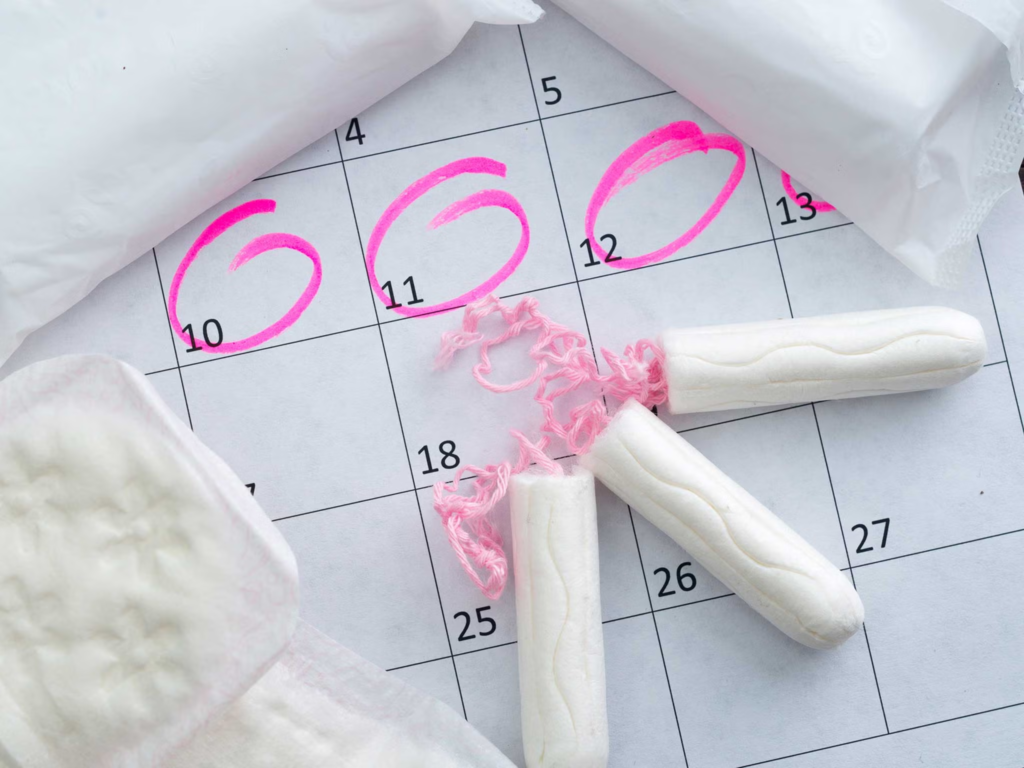
Period- Imagine that perfect beach vacation or that important competition finally clashes with your monthly visitor. While the idea of delaying your period sounds tempting, achieving it with natural methods remains a bit of a mystery.
This article dives into the world of menstrual manipulation, exploring the effectiveness of natural remedies and uncovering the truth behind what science says.
Can You Really Delay Your Period Naturally?
Unfortunately, there’s no scientific evidence to support any natural method definitively delaying your period. Popular recommendations like consuming specific foods (apple cider vinegar, gram lentils), herbal remedies (like cinnamon), or drastic measures (excessive exercise) lack concrete research.
While anecdotal stories abound online, attributing period delays to these practices, they often fall into the realm of “placebo effect” or simply coinciding with natural cycle variations.
Here’s why natural methods might not be the answer:
- Hormonal Harmony: Your menstrual cycle is orchestrated by a complex interplay of hormones, primarily estrogen and progesterone. Natural remedies lack the potency to disrupt this intricate hormonal balance effectively.
- Individuality Matters: Every woman’s cycle is unique, influenced by factors like stress, diet, and exercise. What might work for one person may not affect another.
So, What Are Your Options?

If delaying your period is crucial, hormonal birth control methods offer the most reliable solution. Here’s how they work:
- Combination Birth Control Pills: These pills contain both estrogen and progestin, essentially mimicking a continuous “pregnancy-like” state, preventing ovulation and delaying your period. With your doctor’s guidance, you can skip the inactive placebo week (typically the week with sugar pills) and continue taking the active hormone pills, postponing your period.
- Progestin-Only Pills (POPs): These pills contain only progestin, thinning the uterine lining and making it less likely to shed, thereby delaying your period. Similar to combination pills, you can take them continuously with your doctor’s advice.
- Vaginal Ring: This flexible ring releases a steady dose of progestin, working similarly to POPs to delay your period. You can insert and remove the ring according to a specific schedule to manage your cycle.
Important Note: Consulting a healthcare professional is vital before using any hormonal birth control method. They can discuss your medical history, assess potential risks, and prescribe the most suitable option for you.
Safety First: Things to Consider Before Delaying Your Period
While delaying your period with hormonal birth control is generally safe for most healthy women, there are some factors to consider:
- Underlying Medical Conditions: If you have a history of blood clots, uncontrolled high blood pressure, or certain cancers, hormonal birth control might not be recommended.
- Breakthrough Bleeding: Spotting or breakthrough bleeding can occur during the extended pill-taking period.
- Return of Your Period: Once you stop taking the hormones continuously, your period will likely return within a few days.
Open communication with your doctor is key to ensuring a safe and successful experience with period delay using hormonal methods.
Period Delay Myths Debunked!
Let’s clear the air about some commonly held beliefs regarding natural period delay:
- Stress Management: While chronic stress can disrupt your cycle, there’s no evidence that short-term stress management techniques like meditation or yoga can directly delay your period.
- Dietary Tweaks: Specific foods or drinks (like lemon juice or gelatin) haven’t been proven to influence your menstrual cycle.
Remember: Maintaining a healthy lifestyle with a balanced diet, regular exercise, and adequate sleep is crucial for overall well-being, which can indirectly impact your menstrual cycle.
The Bottom Line: Be Realistic and Informed
While the allure of natural periods delay is understandable, there’s currently no scientific backing for its effectiveness. However, hormonal birth control methods offer a reliable solution with proper medical guidance.
When considering periods of delay, prioritize your health and safety. Discuss your options with a healthcare professional to explore the most suitable approach for your needs. Remember, a healthy and regular menstrual cycle is a sign of overall hormonal balance.
FAQs
Q: Can I delay my periods naturally?
A: Unfortunately, there’s no scientific evidence to support any natural method for delaying your period. Popular claims about foods like lentils, lemon juice, or even gelatin lack research. In fact, some might even disrupt your cycle.
Q: Are there any safe and effective ways to delay my period?
A: Birth control offers the most reliable way to delay your period. With your doctor’s guidance, you can try:
- Combination birth control pills: By skipping the inactive (placebo) week and starting a new pack right away, you can postpone your period.
- Progestin-only pills (mini-pills): Taken continuously, these pills prevent ovulation and a period altogether.
Q: What about stress management or exercise? Can they affect my period?
A: Extreme stress or excessive exercise can disrupt your cycle, potentially causing a delay. However, it’s not a recommended approach and can have negative health impacts. Maintaining a healthy lifestyle with balanced exercise is always a good call, but it won’t guarantee a period of delay.
Q: If natural methods don’t work, are there any side effects to trying them?
A: While some natural remedies may seem harmless, they might interact with medications or have unintended consequences. It’s best to consult a doctor before trying anything new.
Q: Where can I get safe information and advice on delaying my periods?
A: Talking to your doctor is the best course of action. They can discuss your options, considering your health history and recommend the safest approach for delaying your period.
Remember: Don’t rely on unproven methods you find online. There’s a lot of misinformation out there. Consulting a healthcare professional is always the best way to get accurate information and make safe choices about your reproductive health.
To read more, Click here


